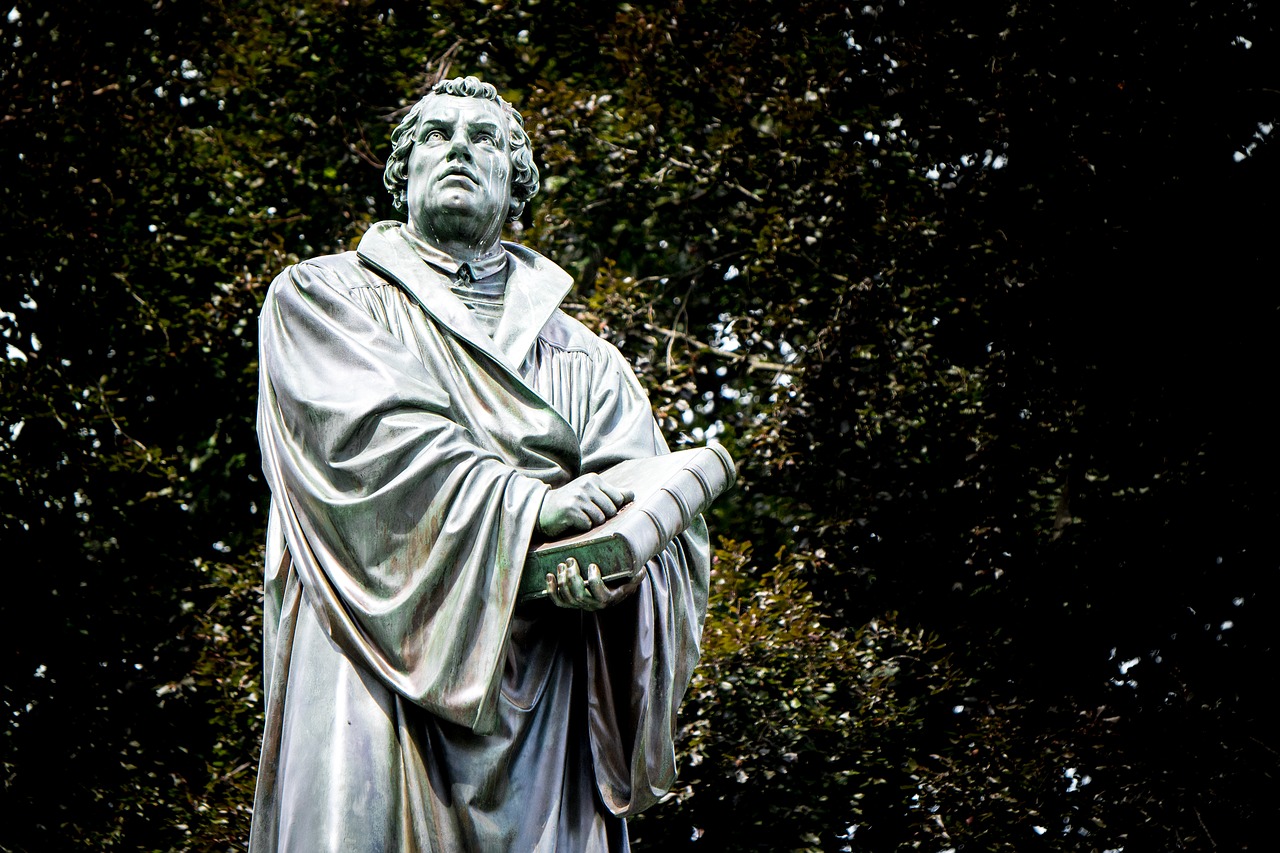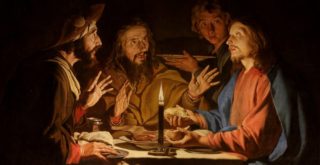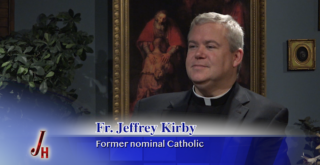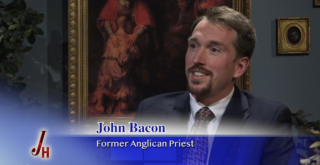
This is the first part of an ongoing article series from Ken Hensley.
“No doctrine is more important to evangelical theology than the doctrine of justification by faith alone — the Reformation principle of sola fide. Martin Luther called it the article that determines whether the church is standing or falling.”¹
These words form the opening sentence of a little book I have in my library titled Justification by Faith Alone. In this book a number of fairly well-known Protestant theologians make the case for the Reformation view and against the Catholic view.
What must we do to inherit eternal life? Do we have to do anything at all? Is salvation something that can be had and then lost? The answers to these sorts of questions are so foundational to the Christian Faith that it’s hard to believe that to this day the doctrine of justification remains one of the most disputed. But it is.
Oh, I hear from time to time about how this whole issue has been resolved. Tell that to the authors of Justification by Faith Alone. For them, the Reformed Protestant doctrine of justification is still the article upon which the church must stand or fall. It is the only view, they believe, that is both true to the teaching of Scripture and that gives glory to God alone. In contrast, the Catholic view is described as “a damning system of works righteousness.”²
Before becoming Catholic, I was in the Reformed Protestant camp for about twenty years. So how does one come to leave behind a view that is “true to the teaching of Scripture and that gives glory to God alone” in order to embrace a “damning system of works righteousness”? This is the question I hope to answer over the next several articles.
Justification by Faith Alone
The Catholic Church has always presented salvation as a process, a process in which we are intimately involved.
This process includes not only the forgiveness of our sins, but also our interior renovation, our sanctification, and our being re- molded in the image of Christ and made fit for heaven. The theological term the Church uses for this process is “justification.”
We can think of the Exodus as an archetype of the Catholic view. While deliverance from bondage in Egypt was God’s gift to the children of Israel, and He provided the Israelites with everything needed to make their journey from Egypt to the Promised Land, still Moses and the people had to actually cross the desert. They had to follow the pillar of cloud and fire. They had to eat the manna given to them every morning. They had to bring their sacrifices and confess their sins again and again. They had to make the journey.
In the same way, the Catholic Church has always viewed salvation as a road that must be taken, a path that must be walked and persevered in. We don’t walk that path in our own strength. We don’t walk it without falling countless times and returning to the Lord over and over to receive forgiveness and grace to begin again. But still, salvation is a process and a process in which we cooperate with God’s Spirit and grace and are actively involved.
Now, Martin Luther was a man who felt himself utterly unable to walk this path of salvation. No matter how hard he tried, God, for Luther, was always an angry Father he would never be able to please. Luther wrote:
I was a good monk and I kept the rule of my order so strictly that I may say that if ever a monk got to heaven by his monkery, it was I. All my brothers in the monastery who knew me will bear me out. If I had kept on any longer, I should have killed myself with vigils, prayers, reading, and other work.³
Looking back many years later, Luther describes how he felt during those years of struggle: “I was more than once driven to the very abyss of despair so that I wished I had never been created. Love God? I hated him!”4
Eventually, Luther was appointed Professor of Scripture at the University of Wittenberg. Between 1513 and 1516, while lecturing through the Psalms and St. Paul’s letter to the Romans, he came to a view of “justification” that was new. He began to teach that justification has nothing to do with God actually making us righteous. Nor does it involve our obedience to God. Rather, the righteousness by which we stand before God, holy and blameless, is a righteousness that is “imputed” to those who simply believe.
Luther spoke of a “glorious exchange” that takes place the instant one looks to Christ in simple faith. At that moment, all of our sins are credited to Christ, and His perfect righteousness is credited to us. God, as it were, legally transfers (“imputes”) to us Christ’s perfect righteousness, and from that moment we are, in terms of our standing before God, as righteous as Jesus Himself.
It’s no wonder this new view of justification brought peace to Luther. He later wrote, “I felt myself to be reborn and to have gone through open doors into paradise. The whole of Scripture took on a new meaning, and whereas before the ‘justice of God’ had filled me with hate, now it became to me inexpressibly sweet.”5
Important Clarifications
So does this mean that those who embrace the doctrine of justification by faith alone don’t believe that God actually changes us and makes us holy — that He just “credits” us as being holy?
Not at all. In fact, most Protestants are quite clear in insisting that those whom God justifies He also sanctifies. He gives them new hearts and the gift of the Holy Spirit and begins in them a process of sanctification conforming them to the image of Christ.
But this, they insist, is not how we are justified. We are made “right” in the sight of God, they would say, by “the imputed righteousness of Christ received by faith alone.”
So does this mean Luther, and Protestants since then, don’t believe that obedience to God is important?
Again, not at all. The vast majority, in fact, view the desire that a Christian has to become holy and obedient to God as “evidence” that that person has been justified. Because, again, “those whom God justifies He also sanctifies.” And what better evidence is there that one has been given a new heart and received the Holy Spirit than that he or she now desires to live a life of holiness?
Protestants care about obedience. What they insist upon is that our obedience has nothing to do with our justification, which is by the imputed righteousness of Christ, received by faith alone.
That is, for Protestants, how we are “saved.”
The Importance of sola fide
Luther’s commitment to justification by faith alone was total. He began to interpret all of Scripture in the light of this teaching, even questioning the inspired authority of the Epistle of James, which he viewed as being in conflict with St. Paul on this matter.
Luther once wrote, “Away with James! Its authority is not great enough to cause me to abandon the doctrine of faith … If they [referring to other teachers] will not agree to my interpretations, then I shall make rubble of it. I almost feel like throwing Jimmy [the Epistle of St. James] into the stove. It is flatly against St. Paul and all the rest of Scripture in ascribing justification to works … Therefore, I do not want him in my Bible.”6
Luther even asserted that no one could be saved who didn’t agree with him on this issue, “I do not admit that my doctrine can be judged by anyone, even the angels. He who does not receive my doctrine [of justification by faith alone] cannot be saved.”7
Would it surprise you to know that this is still how serious Reformation-minded Protestants feel about this issue?
For instance, Dr. John Gerstner, professor for many years at Pittsburgh Theological Seminary, tells in his chapter of Justification by Faith Alone, how he mourned for his former student Scott Hahn when he learned of Scott’s conversion to the Catholic Faith. He mourned because he believed that no one could be saved who had once understood and embraced the doctrine of justification by faith alone and then rejected it.
Dr. Gerstner writes, “Instead of leaving the Protestant Church … [Scott] was leaving the lost world into which he was born — and from which he was never actually separated — for the false church of Rome. He has leapt from the frying pan into the fire, and only God can deliver him as a brand from the burning.”8
Are Catholics Even Christians?
Here’s the question some of you must be asking at this point: Why? Why is Luther ready to throw Jimmy [the Epistle of St. James] in the stove rather than question his own doctrine of justification? Why is Professor Gerstner, a sincere follower of Jesus Christ, ready to consign Scott Hahn to hell over this issue? Are Catholics not even Christians in their eyes? Is it their way or the highway when it comes to justification?
Yes, it is. And here’s the reason: as they understand the teaching of Scripture, there are really only two options: either one is justified by the imputed righteousness of Christ, received by faith alone, or one is involved in some damning system of works righteousness and attempting to “earn” their own salvation.
So, if we are “made right” in the sight of God because the perfect righteousness of Jesus Christ has been “credited” to our account, then — so the reasoning goes — salvation is entirely the free gift of God. Then you and I have nothing about which to boast. Then God receives all the glory for the great work of salvation.
On the other hand, if we are “made right” in the sight of God by a process involving — in any sense whatsoever! — our cooperation with God, our obedience to God, then salvation is not the free gift of God. Then you and I have in some sense “earned” our salvation. Then we have something about which to boast. Then God does not receive all the glory for the great work of salvation.
This is how those committed to justification by faith alone think about this issue. In their view, the only way to protect the full glory of God in the work of redemption is to make sure that human activity does not enter into the picture in any way.
Now, we Catholics know that salvation is the free gift of God and that there will be no grounds for boasting when we enter the presence of God. And even though salvation involves a path that we must walk, that it’s a process in which we are involved, we know that it’s God’s grace that enables us to walk this path. We know this.
But no. According to the authors of Justification by Faith Alone, because we believe that we must use our freedom to cooperate with God’s grace, and that faith and obedience are required in order to inherit eternal life, we are teaching salvation by works. We have embraced a “damning system of works righteousness.”
Here’s how Reformed Baptist pastor and author John MacArthur sums up the situation:
“The difference between Rome and the Reformers is not theological hair-splitting. A right understanding of justification by faith is the very foundation of the gospel. You cannot go wrong at this point without corrupting every other doctrine as well. And that is why every “different gospel” is under the eternal curse of God.”9
Conclusion
Now, this Reformed doctrine of justification is one I know well. It’s the only view I knew in my early years as a Christian. I was taught this view in Bible College and Seminary. It was the view of all my theological heroes: Calvin, Luther, the Puritans. I taught it myself for a number of years as a Protestant pastor.
But over time I began to have doubts. And it wasn’t because I was paying attention to the writings of Catholic theologians. This would come much later in the story. It was because I was paying attention to the writings of the Old and New Testaments, including the writings of St. Paul. This is what set me to doubting.
So what was it that started me thinking that the classic Protestant teaching on justification was not the teaching of the Bible? What set me on a path that concluded a decade later with my receiving the sacraments and entering the Catholic Church?
This is where we will begin in the next article.
Up Next: A Damning System of Works Righteousness, Part II










